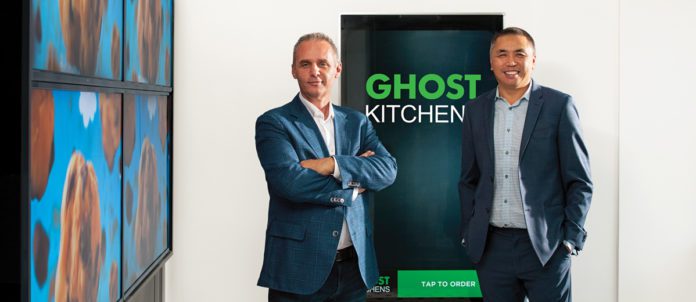It was after George Kottas’ breakfast restaurant had 30 missed orders after hours on Uber Eats that the light bulb came on. Inspired by the idea of using a closed restaurant for delivery, Kottas began experimenting with multiple concepts out of his establishment to introduce new menus to customers. Within weeks, Kottas was successfully operating Canada’s first ghost-kitchen concept.
“It took some convincing, but I finally got them [Uber Eats] to [accept my idea],” says Kottas. “I quickly had nine brands running out of one kitchen. That’s when I knew [the concept was a winner].”
Since its inception in 2017, Ghost Kitchen Brands – Foodservice and Hospitality magazine’s Regional Company of the Year – has grown exponentially, representing a fundamental shift in the foodservice industry. By leveraging the popularity of third-party delivery apps, Ghost Kitchen Brands is optimized to offer more than 20 brands from roughly 28 locations in Canada and one in the U.S., with more locations being added monthly. Brand partnerships include Quiznos, The Cheesecake Factory, Jamba Juice, Ben & Jerry’s, Nathan’s Famous and more.
“One of the original orders I got was a bottle of Nestle Pure Life, but the customer paid almost $9 in delivery,” says Kottas. The world was changing. [Customers] were looking for convenience more than anything. They weren’t too concerned about delivery fees.”
For the first four years, Kottas says one of the biggest challenges was convincing family, friends and industry leaders of the value of his innovation. “Everyone thought I was a complete idiot. No one understood what I was doing and no one believed in what I was doing,” says Kottas. “The industry was so young when I started. When I opened my second store, Uber didn’t have enough drivers to service the area, and that was in North York. Now, everyone thinks I’m a genius, but convincing them that I was on the right track was challenging.”
The development also required a significant investment of Kottas’ time. “It’s been fun, but like any business, we’ve had our ups and downs,” says Kottas. “The amount of work in getting this off the ground was significant – seven days a week, 16 hours a day.”
As a result of the COVID-19 pandemic, consumer demand for contactless food delivery has soared. Ghost Kitchen Brands offers a scalable business model, allowing the company to expand its footprint in North America at a rapid pace. In March 2021, it announced partnerships with Walmart Canada and Saladworks. The first Walmart location was in St. Catharines, Ont., followed by Woodstock, Ont., and Toronto, with two more locations set to open in Quebec. Ghost Kitchen Brands’ agreement with Saladworks will bring 60 new locations to the U.S. and 30 to Canada by the end of this year. Since then, the dynamic company has also partnered with Wow Bao, Lola’s Food Inc., Yogen Fruz and Shaquille O’Neal’s Big Chicken brand.
When it comes to selecting brands to partner with, Kottas only looks for a few factors. “Regions are the main thing and we’re only taking on national brands right now,” says Kottas. “If there’s heavy cooking involved, heavy preparation times or complications that don’t fit within our system, then we won’t take it on.”
Kottas has set the stage for innovative disruption, unlocking limitless possibilities for businesses and consumers alike. Currently, Ghost Kitchen Brands operates in three formats: standalone, mall food court and big-box store. “We’re a disruptor to the foodservice and hospitality industry,” says Kottas. “Essentially, we’ve created a national, online food court. Our model works anywhere, whether it’s an office building, apartment building, university, airport or Walmart. It’s been fairly easy to hire brands. It was initially one of the hardest things because no one understood where this was heading. Now, we’re the leaders in the industry.”
Because ghost kitchens don’t require traditional customer service, the team can use its time more effectively in the kitchen. As the company’s brand portfolio continues to grow, its small kitchen teams still perform impressively.
“Each brand has its own little section in the kitchen, and all the staff are cross-trained,” says Kottas. “Most importantly, we don’t have a front-of-house. Everything is ordered on kiosks or through third-party platforms, so our staff is 100-per-cent focused on the execution of the products.”
Furthermore, Ghost Kitchen Brands encourages its teams in each location to tap into local community-outreach programs. For example, staff at its Liberty-Village location in Toronto sent hundreds of care packages, in partnership with Cinnabon and Daydream, to emergency-room workers at Sunnybrook Hospital and intensive care unit (ICU) workers at St. Michael’s Hospital in recognition of their contributions over the course of the pandemic. Teams at other locations sent care packages to local senior-living facilities.
Ghost Kitchen Brands has gained traction and will continue to expand its offerings for years to come. In November, Ghost Kitchen Brands launched its newest partnership with the much-loved Smoke’s Poutinerie brand.
“I’m excited to get things fired up with an amazing group like Ghost Kitchen Brands,” says Ryan Smolkin, Chief Entertainment Officer at Smoke’s. “[They’re] a leader in an explosive new segment of our competitive industry, and we’re pumped to be on the rock n’ roll gravy train with them.”
Certainly, more restaurants are turning to this concept to introduce new menus and expand their reach without having to hire additional staff or open a new location amid the ongoing COVID-19 pandemic. In turn, the convenience of bundling menus encourages customers to order more and ultimately boosts profits.
“We’ve committed to open [more locations] next year in Canada and U.S. We’ve already acquired the real estate and put an area developer program in place,” says Kottas. “We stopped development for about six months to solidify the company’s infrastructure and ensure we had the right people in place, but come January, we’re going to be opening 60 to 70 stores a month.”
Kottas says he’s often referred to as the pioneer of the ghost-kitchen industry. He’s been involved in franchise business and corporate roles, but his passion and dedication for entrepreneurship has allowed him to diversify and take advantage of changing cultural, social and operational demands. Ultimately, the company’s goal is to have a Ghost Kitchen open every 12km. If Ghost Kitchen Brands continues on its current trajectory, it won’t take long to reach that goal.
By Nicole Di Tomasso | Photography By Margaret Mulligan



















